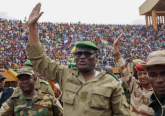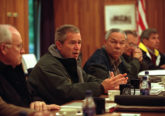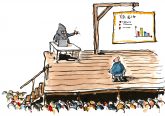 Sir Graeme Lamb is not fond of theorising. However, the former Director of the UK Special Forces can claim to have played an important part in the initiative that pacified large parts of Iraq after 2006. Much of what he argued for is now part of the official US counterinsurgency strategy. But while it is easy for academics and other observers to demand that armed forces should ‘reach out’ to insurgents, there is precious little guidance on the practicalities of initiating a meaningful conversation with the people determined to bomb the foreigners out of their homeland. Lamb shared his insights as part of Emma Sky’s seminar series in Oxford on 25 October, jointly hosted by the Changing Character of War programme and the Centre for International Studies. His account of his experiences in Iraq began by pointing out the major obstacle in the way towards brokering talks with Iraqi insurgents: obtaining permission from the Coalition’s military leadership. Their opposition was a moral one: first, these people had blood on their hands, and often the blood of coalition soldiers. Second, they are not regular soldiers but terrorists who hide during the day and plant IEDs at night. Lamb argued (successfully) that the forces which had invaded Iraq in 2003 were not universally seen as blameless liberators, and that the difference between a 500lb bomb and an IED was a technological, not a moral one.
Sir Graeme Lamb is not fond of theorising. However, the former Director of the UK Special Forces can claim to have played an important part in the initiative that pacified large parts of Iraq after 2006. Much of what he argued for is now part of the official US counterinsurgency strategy. But while it is easy for academics and other observers to demand that armed forces should ‘reach out’ to insurgents, there is precious little guidance on the practicalities of initiating a meaningful conversation with the people determined to bomb the foreigners out of their homeland. Lamb shared his insights as part of Emma Sky’s seminar series in Oxford on 25 October, jointly hosted by the Changing Character of War programme and the Centre for International Studies. His account of his experiences in Iraq began by pointing out the major obstacle in the way towards brokering talks with Iraqi insurgents: obtaining permission from the Coalition’s military leadership. Their opposition was a moral one: first, these people had blood on their hands, and often the blood of coalition soldiers. Second, they are not regular soldiers but terrorists who hide during the day and plant IEDs at night. Lamb argued (successfully) that the forces which had invaded Iraq in 2003 were not universally seen as blameless liberators, and that the difference between a 500lb bomb and an IED was a technological, not a moral one.
When to talk to terrorists
The reason why Lamb’s arguments won the day, and why the insurgents accepted the eventual offer to meet, is the most important precondition for successful conversations: universal exhaustion, and the fear that a grim reality might be succeeded by a grimmer future. As Lamb explains, ’there were things we could do in 2006 that we could not have done in 2004 or 2005.’ While that answers the question when to talk to terrorists, it is even more important to make the right choice whom to talk to. Lamb does not draw a distinction between ‘terrorists’ and ‘insurgents’. For him, the important test is whether the opponents are ‘irreconcilables’ who fight for ideological reasons or are driven by nihilist instincts, or whether they fight because they have some kind of grievance that can potentially be addressed. It is impossible to convert hardcore ideologues to the virtues of peaceful coexistence over a cup of tea. However, they will usually be surrounded by less radical individuals, or have formed coalitions with groups that share a common enemy. Most of these groups fight because they believe that the occupying force is threatening their way of life, or their faith. Lamb argues that all too often Westerners have succumbed to the temptation of talking with those locals who are most like them: well-spoken, sometimes Western-educated liberals seeking support for their vision of a reformed society. They often have persuasive arguments to support their views, but their opinions count for little or nothing among those conducting the insurgency. Rather, Lamb argues, the ideal person to talk to is close to the outer edge of the local political spectrum, right next to the irreconcilables, but nonetheless fighting primarily for the future security of their tribe, clan or region. That implies a very thorough understanding of what the political spectrum looks like, and what the people at various ends of it are actually fighting for.
How to approach terrorists without alienating them
The individuals conducting or leading an insurgency are usually seasoned politicians, well-versed in tribal politics and the logistics of small-scale violence and regional warfare. They have learned to judge other human beings based on their deeds rather than their words. They will collect all information they can obtain about the behaviour of military or political leaders operating in their area. To win their respect and trust, it is vital to refrain from atrocities, especially against the women and children in their communities. Such acts will inflame the passions of those who see it as their mission to protect their communities, and shape their expectations. In Iraq, one tribal leader remarked to Lamb that his men had observed him and the US marines for over three years before concluding they had probably not arrived to kill as many Muslims as possible.
Once the two sides meet, translators should be instructed to avoid the word ‘negotiations’. One tense first meeting between Lamb and Iraqi insurgents almost turned violent because the translator said ‘negotiations’ where Lamb had meant ‘dialogue’. This was no subtle difference: the insurgents knew full well that if others on their side gained the impression that they had come for negotiations with the Americans instead of a simple exchange of opinions then their death would only be a matter of time.
How to attack terrorists to facilitate further dialogue
Throughout the ages, human beings have held to the maxim that talks between warring factions are best supported by a temporary pause in hostilities. Lamb disagrees, and argues that since they only agreed to talks in the first place because of the intense pressure they were under, keeping up that pressure is the best way of encouraging those who are thinking about alternatives to fighting. Those latter individuals, however, should not be targeted, and Lamb remembers one incident where a particular Iraqi insurgent was taken off a ‘hit list’ to allow him to persuade his allies that the Americans were serious about their offers.
What to talk about when meeting terrorists
Lamb states that the most important aspect is to understand the true nature of the grievances that motivate the insurgents to fight. All too often, he claims, American officers arrived saying ‘Look at what we’ve brought for you!’, instead of beginning by asking ‘What do you actually need and how can we help?’. With luck, these interactions can help persuade insurgents that their enemies have not come to eradicate their culture and way of life, and establish a level of trust. However, Lamb is adamant that this is not an exercise in winning friends. Moreover, once a process of interaction is underway, it is important not to rush it. One should never appear to be one step ahead of the insurgents: after all, their position is at least as delicate as that of the Western ‘negotiator’, and if anything goes wrong that is not explicitly cleared by both sides, the temptation is to lay all the blame on the enemy and find an easy way out of the process.
In summary, such discussions can turn sour at any time, and will only succeed if the conditions are exactly right. Lamb’s 2009 effort in Afghanistan was no spectacular success like in Iraq and probably came too late, at a time when the foreigner’s urge to extract themselves from the conflict was already far too apparent. Lamb himself is more optimistic here and believes that the initiation of Afghan-led dialogue towards a better life is an important achievement, and might leave a positive legacy for a future that no longer involves NATO negotiators.






No Comment